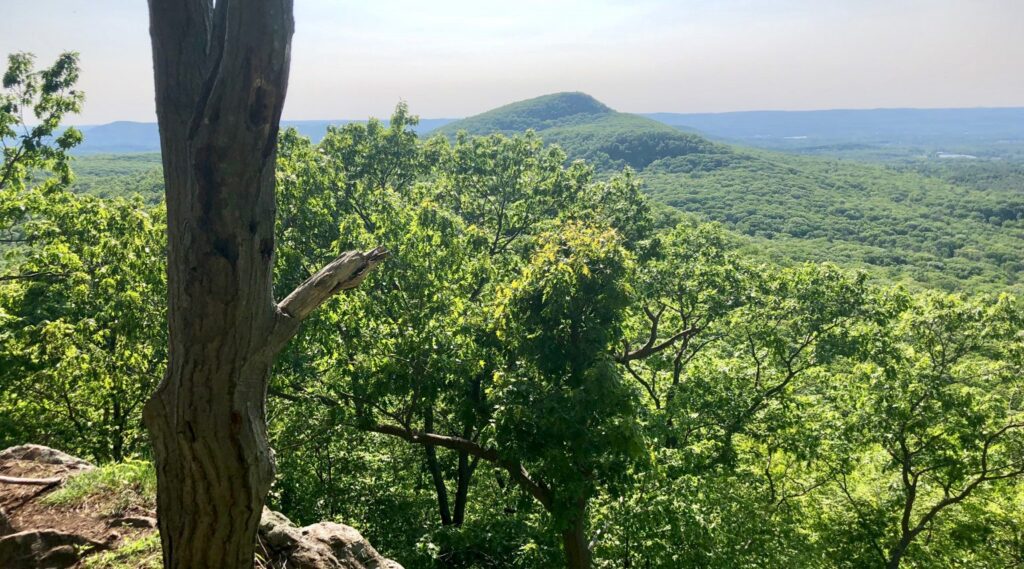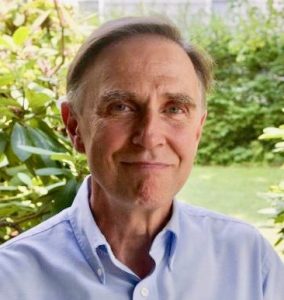Opinion: Changing The Language Of Climate Change

Mount Norwottuck, Massachusetts in the distance. Photo: Russ Vernon-Jones.
Love, Justice And Climate Change

It’s getting easier and easier to have conversations about the climate crisis. More people than ever are concerned about it; the media are covering it more; and the U.S. government has approved billions of dollars to fund solutions. Having these conversations is more important than ever. There are still widespread misconceptions that are slowing down efforts to solve the crisis. The public demand for action does not yet match the magnitude of the crisis we are in. The fossil fuel industry and its political lackeys are still trying to slow the transition to renewable energy.
The Words We Use And The Stories We Tell Matter
Writing in Scientific American, Susan Joy Hassol says, “The words we use and the stories we tell matter. Transforming the way we talk about climate change can engage people and build the political will needed to implement policies strong enough to confront the crisis with the urgency required.”
“Natural”
Let’s start with the word “natural.” The fossil fuel industry likes to refer to one of its major products as “natural gas.” This makes it sound healthy and good. It’s actually “methane gas,” a poisonous substance that is a major portion of the heat-trapping pollution that is causing the climate crisis. We need language that helps the public feel negatively about this dangerous gas. A study by Yale Program on Climate Change Communication found that both Republicans and Democrats had the most negative feelings about “methane” and “methane gas,” while the most positive feelings were associated the term “natural gas.” So let’s call it “methane gas.”
The term “natural” has commonly referred to things occurring in nature that are not influenced by humans. Now that so many of the powerful storms, floods, droughts, and extreme heat events are created by, or significantly exacerbated by, human-caused climate disruption, it is no longer appropriate to refer to them as “natural disasters.” These are “unnatural disasters” caused by human disruption of the climate.
“Heat-trapping Pollution” Rather Than “Greenhouse Gasses”
“Climate change” has become a common term. With some people it may be more helpful to talk about “human-caused climate disruption.” “Climate crisis” and “climate emergency” are accurate and useful terms. “Heat-trapping pollution” is a more informative term than “greenhouse gases.” It makes sense to use the word “pollution” more often because it is both accurate and has negative associations.
Beyond the issue of vocabulary, the fossil fuel industry and their political accomplices continue to promote misconceptions that slow climate action. For instance, they try to get us to focus on personal carbon footprints rather than on the huge, systematic, harmful role of the big oil and gas corporations. They promote the lies that climate solutions are too expensive and can’t be relied upon.
The Cost Of Clean Energy Has Dropped 90%
One key fact we can repeat again and again is that the cost of clean energy has dropped so dramatically, that it’s cheaper than dirty energy. As I’ve written before, prices of both solar power and batteries have dropped roughly 90 percent in the last ten years. It would make a difference if we could repeat this fact often enough for it to stick in people’s minds.
Most People In The U.S. Support Climate Action
If we can help clear up two other common misconceptions it will make a difference. The first is that most people think that those who support climate change policies are a minority of the population. In fact research in 2022 found that 66% to 80% of the population support such policies, but that the public thinks only about 39% does. Social science has revealed that people are much more likely to talk about a topic, take action, and build political pressure when they think they are in the majority. Climate action would grow powerfully if everyone in the U.S. understood how many people are concerned and want action.
It’s Not Too Late To Act
The second common misconception is that it too late to act. While it is true that it is too late to prevent loss and damage from the ways humans have disrupted the climate, it is not to late for our actions to make a difference. Every fraction of a degree that we can slow or reduce global warming will save lives, livelihoods, health, and well-being for millions of people. We can reassure everyone that action now can make a difference. It’s time to act, not delay or give up.
Envision And Share A Positive Clean Energy Future
When we talk about the climate situation we have to opportunity to envision and share a picture of the future. In that same Scientific American article quoted above, Susan Joy Hassol says, “To inspire people, we need to tell a story not of sacrifice and deprivation but of opportunity and improvement in our lives, our health and our well-being—a story of humans flourishing in a post-fossil-fuel age.”
Now that climate change is beginning to affect almost every aspect of life, we can make sure that when we talk about the climate crisis we don’t just talk about polar bears or “the environment.” Adopting clean energy will have a huge public health impact–saving an estimated 8.7 million lives a year from deadly air pollution. It is creating millions of new jobs and saving families money. Solving the climate crisis will help our farmers, preserve fishing and skiing as forms of recreation, and keep some of our favorites like chocolate and coffee more available, as well as reducing our discomfort from summer heat and wildfire smoke.
It’s The Big Polluters That Are The Problem
Annie Leonard, the former head of Greenpeace, says that we need to be clear that our fight is against the big polluters who are causing the climate disruption. The research shows that the best language is: “Climate change is caused by pollution, plain and simple. Big polluters hurt our economy, health, and communities. They need to be held accountable for this damage. Big polluters are the elite few protecting their profits over the health and safety of all American families.” She says the key is to repeat this language over and over again until it becomes widespread and familiar.
I have two thoughts about how we can use all this information. One is that we could try to use the suggested language and approaches in our conversations. The other is that we could start conversations with people about the best language to use in talking about climate and ask what they think of one or more of the suggestions above.
Russ Vernon-Jones was principal of Fort River School 1990-2008 and is currently a member of the Steering Committee of Climate Action Now-Western Massachusetts. He blogs regularly on climate justice at www.russvernonjones.org.
________________
The title of this post is taken from a graphic in Scientific American.
